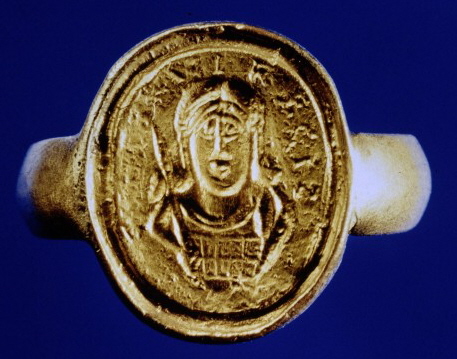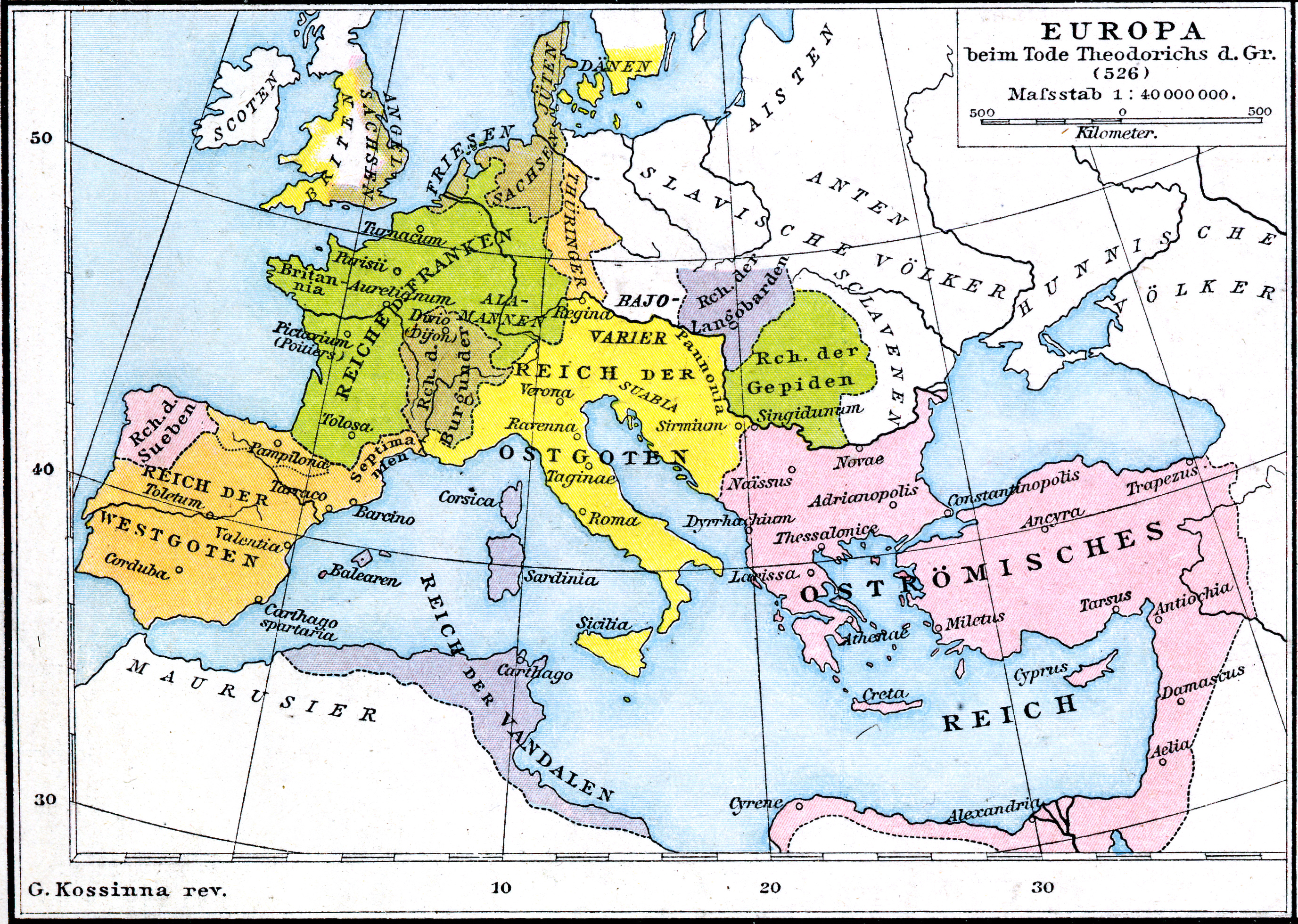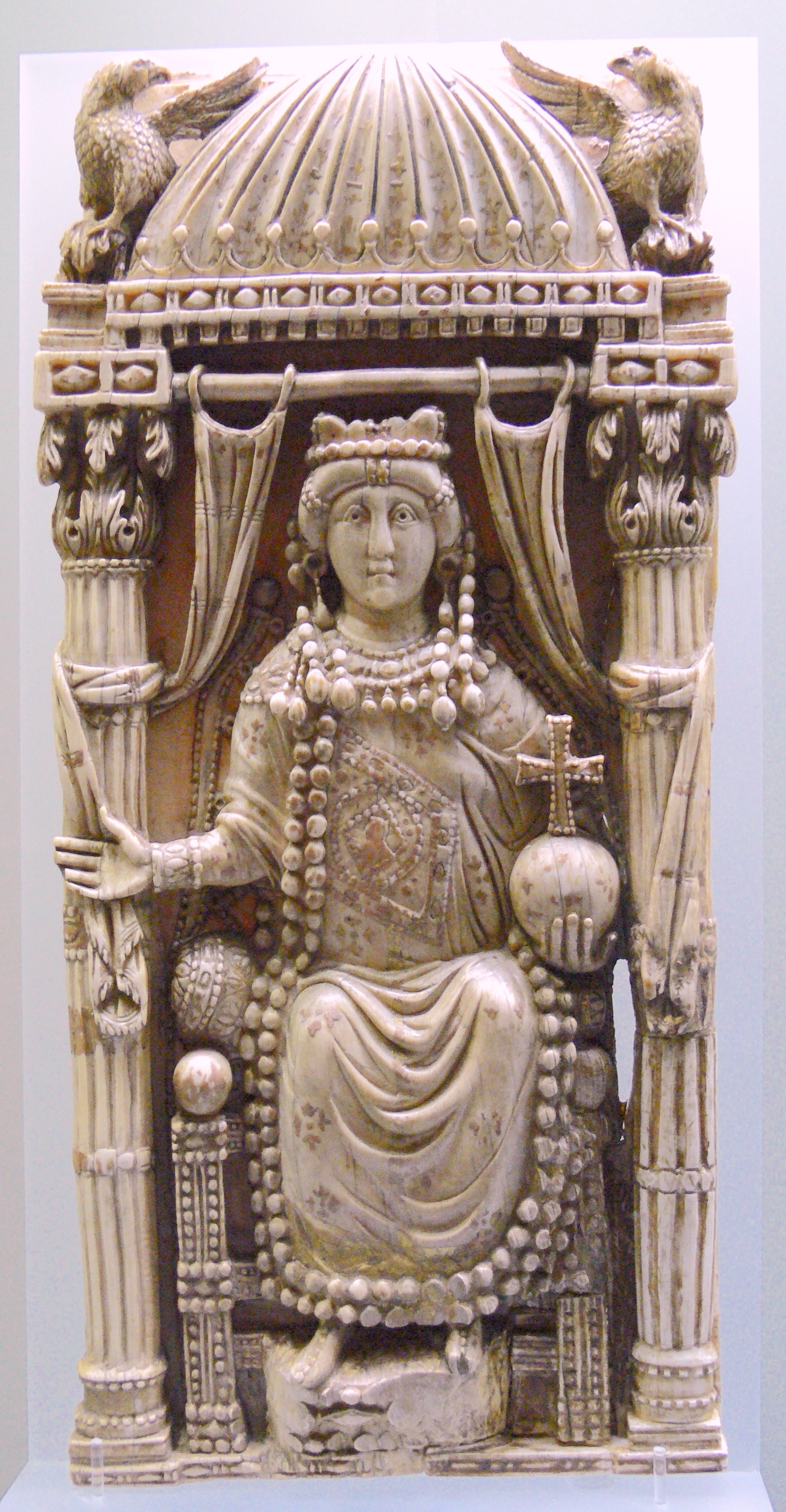|
469
Year 469 ( CDLXIX) was a common year starting on Wednesday of the Julian calendar. At the time, it was known as the Year of the Consulship of Marcianus and Zeno (or, less frequently, year 1222 ''Ab urbe condita''). The denomination 469 for this year has been used since the early medieval period, when the Anno Domini calendar era became the prevalent method in Europe for naming years. Events By place Roman Empire * Ostrogoth prince Theodoric, age 15, returns to Pannonia, after living as a child hostage at the court of Emperor Leo I in Constantinople (see 459). Europe * The Vandals invade Epirus (modern Greece). They are expelled from the Peloponnese (Greece) and in retaliation, the Vandals take 500 hostages at Zakynthos. On the way back to Carthage theyare slaughtered. * King Euric declares himself independent from the Western Roman Empire. He extends the Visigothic power in Hispania; conquering the cities of Pamplona, Zaragoza and Mérida. By topic Relig ... [...More Info...] [...Related Items...] OR: [Wikipedia] [Google] [Baidu] |
Marcianus (son Of Anthemius)
Flavius Marcianus (Ancient Greek, Greek: Μαρκιανός, AD 469–484) was a member of the Leonid dynasty. The son of the Western emperor Anthemius, Marcianus married Leontia (daughter of Leo I), Leontia, the daughter of the Eastern Roman emperor Leo I (emperor), Leo I. He was consul twice, and in 479 unsuccessfully attempted to overthrow the emperor Zeno (emperor), Zeno. After his capture he was forced to become a monk; he escaped and raised an army but was defeated and recaptured by Flavius Appalius Illus Trocundes. In 484, when the Isaurian general Illus revolted against Zeno, Marcianus was freed and Illus proclaimed him emperor, before deposing him in favour of Leontius (usurper), Leontius. Biography Marcianus was a member of several Roman imperial families. His father was Anthemius, Western Roman emperor between 467 and 472, who descended from Procopius (usurper), Procopius, usurper in 365–366 against Emperor Valens and relative of Emperor Julian (emperor), Julian ... [...More Info...] [...Related Items...] OR: [Wikipedia] [Google] [Baidu] |
Calendar Era
A calendar era is the period of time elapsed since one '' epoch'' of a calendar and, if it exists, before the next one. For example, the current year is numbered in the Gregorian calendar, which numbers its years in the Western Christian era (the Coptic Orthodox and Ethiopian Orthodox churches have their own Christian eras). In antiquity, regnal years were counted from the accession of a monarch. This makes the chronology of the ancient Near East very difficult to reconstruct, based on disparate and scattered king lists, such as the Sumerian King List and the Babylonian Canon of Kings. In East Asia, reckoning by era names chosen by ruling monarchs ceased in the 20th century except for Japan, where they are still used. Ancient dating systems Assyrian eponyms For over a thousand years, ancient Assyria used a system of eponyms to identify each year. Each year at the Akitu festival (celebrating the Mesopotamian new year), one of a small group of high officials (includ ... [...More Info...] [...Related Items...] OR: [Wikipedia] [Google] [Baidu] |
Theodoric The Great
Theodoric (or Theoderic) the Great (454 – 30 August 526), also called Theodoric the Amal, was king of the Ostrogoths (475–526), and ruler of the independent Ostrogothic Kingdom of Italy between 493 and 526, regent of the Visigoths (511–526), and a patrician (ancient Rome)#Late Roman and Byzantine period, patrician of the Byzantine Empire#Loss of the Western Roman Empire, Eastern Roman Empire. As ruler of the combined Gothic realms, Theodoric controlled an empire stretching from the Atlantic Ocean to the Adriatic Sea. Though Theodoric himself only used the title 'king' (''rex''), some scholars characterize him as a Roman Emperor#Later assertions to the title, Western Roman emperor in all but name, since he ruled a large part of the former Western Roman Empire described as a ''Res Publica'', had received the former Western imperial regalia from Constantinople in 497 which he used, was referred to by the imperial title ''princeps'' by the Italian aristocracy and exercised imper ... [...More Info...] [...Related Items...] OR: [Wikipedia] [Google] [Baidu] |
Constantinople
Constantinople (#Names of Constantinople, see other names) was a historical city located on the Bosporus that served as the capital of the Roman Empire, Roman, Byzantine Empire, Byzantine, Latin Empire, Latin, and Ottoman Empire, Ottoman empires between its consecration in 330 until 1930, when it was renamed to Istanbul. Initially as New Rome, Constantinople was founded in 324 during the reign of Constantine the Great on the site of the existing settlement of Byzantium, and shortly thereafter in 330 became the capital of the Roman Empire. Following the collapse of the Western Roman Empire in the late 5th century, Constantinople remained the capital of the Eastern Roman Empire (also known as the Byzantine Empire; 330–1204 and 1261–1453), the Latin Empire (1204–1261), and the Ottoman Empire (1453–1922). Following the Turkish War of Independence, the Turkish capital then moved to Ankara. Although the city had been known as Istanbul since 1453, it was officially renamed as Is ... [...More Info...] [...Related Items...] OR: [Wikipedia] [Google] [Baidu] |
Mérida, Spain
Mérida () is a city and Municipalities of Spain, municipality of Spain, part of the Province of Badajoz, and capital of the autonomous community of Extremadura. Located in the western-central part of the Iberian Peninsula at 217 metres above sea level, the city is crossed by the Guadiana and Albarregas rivers. The population was 60,119 in 2017. Etymology The place name of ''Mérida'' derives from the Latin ''Emerita'', with a meaning of ''retired'' or ''veteran''. It is part of the name that the city received after its foundation by the emperor Augustus in 25 BC, ''Augusta Emerita'', colony in which veteran soldiers or emeritus settled. History Prehistory Mérida has been populated since prehistoric times, as demonstrated by a prestigious hoard of gold jewellery excavated from a girl's grave in 1870. Consisting of two penannular bracelets, an armlet, and a chain of six spiral wire rings, the hoard is now preserved at the British Museum. Antiquity The town was founded in ... [...More Info...] [...Related Items...] OR: [Wikipedia] [Google] [Baidu] |
Vandals
The Vandals were a Germanic people who were first reported in the written records as inhabitants of what is now Poland, during the period of the Roman Empire. Much later, in the fifth century, a group of Vandals led by kings established Vandal kingdoms first within the Iberian Peninsula, and then in the western Mediterranean islands, and North Africa. Archaeologists associate the early Vandals with the Przeworsk culture, which has led to some authors equating them to the Lugii, who were another group of Germanic peoples associated with that same archaeological culture and region. Expanding into Dacia during the Marcomannic Wars and to Pannonia during the Crisis of the Third Century, the Vandals were confined to Pannonia by the Goths around 330 AD, where they received permission to settle from Constantine the Great. Around 400, raids by the Huns from the east forced many Germanic tribes to migrate west into the territory of the Roman Empire and, fearing that they might be ... [...More Info...] [...Related Items...] OR: [Wikipedia] [Google] [Baidu] |
Visigoths
The Visigoths (; ) were a Germanic people united under the rule of a king and living within the Roman Empire during late antiquity. The Visigoths first appeared in the Balkans, as a Roman-allied Barbarian kingdoms, barbarian military group united under the command of Alaric I. Their exact origins are believed to have been diverse but they probably included many descendants of the Thervingi who had moved into the Roman Empire beginning in 376 and had played a major role in defeating the Romans at the Battle of Adrianople in 378. Relations between the Romans and Alaric's Visigoths varied, with the two groups making treaties when convenient, and warring with one another when not. Under Alaric, the Visigoths invaded Italy and sack of Rome (410), sacked Rome in August 410. The Visigoths were subsequently settled in southern Gaul as ''foederati'' to the Romans, a relationship that was established in 418. This developed as an independent kingdom with its Capital city, capital at Toulou ... [...More Info...] [...Related Items...] OR: [Wikipedia] [Google] [Baidu] |
Zeno (emperor)
Zeno (; ; – 9 April 491) was Eastern Roman emperor from 474 to 475 and again from 476 to 491. His reign was plagued by domestic revolts and religious dissension, but was more successful on the foreign front. He is credited with further stabilizing the Eastern empire, while the Western Roman Empire fell following the deposition of Romulus Augustulus. Born in Isauria, Zeno was known as Tarasis before adopting his Greek name and becoming an ally of Emperor Leo I (emperor), Leo I, who saw the Isaurian general as an important counterweight against the Germanic leader Aspar. In 466, he married Leo I's daughter, Ariadne (empress), Ariadne, with whom he had a son, Leo II (emperor), Leo. On the death of Leo I in 474, Zeno's seven-year-old son took the throne as Leo II, with Zeno made co-emperor shortly after. Leo II died of an illness later that year, leaving Zeno as the sole emperor. Despite his early success in making peace with the Vandals, Zeno was an unpopular emperor due to his ... [...More Info...] [...Related Items...] OR: [Wikipedia] [Google] [Baidu] |
Greece
Greece, officially the Hellenic Republic, is a country in Southeast Europe. Located on the southern tip of the Balkan peninsula, it shares land borders with Albania to the northwest, North Macedonia and Bulgaria to the north, and Turkey to the east. The Aegean Sea lies to the east of the Geography of Greece, mainland, the Ionian Sea to the west, and the Sea of Crete and the Mediterranean Sea to the south. Greece has the longest coastline on the Mediterranean Basin, spanning List of islands of Greece, thousands of islands and nine Geographic regions of Greece, traditional geographic regions. It has a population of over 10 million. Athens is the nation's capital and List of cities and towns in Greece, largest city, followed by Thessaloniki and Patras. Greece is considered the cradle of Western culture, Western civilisation and the birthplace of Athenian democracy, democracy, Western philosophy, Western literature, historiography, political science, major History of science in cl ... [...More Info...] [...Related Items...] OR: [Wikipedia] [Google] [Baidu] |
Ostrogoths
The Ostrogoths () were a Roman-era Germanic peoples, Germanic people. In the 5th century, they followed the Visigoths in creating one of the two great Goths, Gothic kingdoms within the Western Roman Empire, drawing upon the large Gothic populations who had settled in the Balkans in the 4th century. While the Visigoths had formed under the leadership of Alaric I, the new Ostrogothic political entity which came to rule Italy was formed in the Balkans under Theodoric the Great. Theoderic's family, the Amal dynasty, accumulated royal power in Roman Pannonia after the death of Attila, and collapse of his Hunnic empire. Byzantine Empire, Byzantine Zeno (emperor), Emperor Zeno played these Pannonian Goths off against the Thracian Goths to their south. However, instead the two groups united after the death of the Thracian leader Theoderic Strabo and his son Recitach. Zeno then backed Theodoric to invade Italy and replace Odoacer there, whom he had previously supported as its king. In 493, ... [...More Info...] [...Related Items...] OR: [Wikipedia] [Google] [Baidu] |
Euric
Euric ( Gothic: 𐌰𐌹𐍅𐌰𐍂𐌴𐌹𐌺𐍃, ''Aiwareiks'', see ''Eric''), also known as Evaric ( 420 – 28 December 484), son of Theodoric I, ruled as king (''rex'') of the Visigoths, after murdering his brother, Theodoric II, from 466 until his death in 484. Sometimes he is called Euric II. Reign With his capital at Toulouse, Euric inherited a large portion of the Visigothic possessions in the Aquitaine region of Gaul, an area that had been under Visigothic control since 415. Over the decades the Visigoths had gradually expanded their holdings at the expense of the weak Roman government, including Euric's sieges of Clermont in 475 and 476, as well as advancing well into Hispania in the process. Upon becoming king, Euric defeated several other Visigothic kings and chieftains in a series of civil wars and soon became the first ruler of a truly unified Visigothic nation. Taking advantage of the Romans' problems, he extended Visigothic power in Hispania, driving the Su ... [...More Info...] [...Related Items...] OR: [Wikipedia] [Google] [Baidu] |
Zaragoza
Zaragoza (), traditionally known in English as Saragossa ( ), is the capital city of the province of Zaragoza and of the autonomous communities of Spain, autonomous community of Aragon, Spain. It lies by the Ebro river and its tributaries, the Huerva and the Gállego (river), Gállego, roughly in the centre of both Aragon and the Ebro basin. On 1 January 2021, the population of the municipality of Zaragoza was 675,301, (as of 2023, the Ranked lists of Spanish municipalities#By population, fourth or fifth most populous in Spain) on a land area of . It is the list of cities in the European Union by population within city limits, 26th most populous municipality in the European Union. The population of the metropolitan area was estimated in 2006 at 783,763 inhabitants. The municipalities of Spain, municipality is home to more than 50 percent of the Aragonese population. The city lies at an elevation of about height above mean sea level, above sea level. Zaragoza hosted Expo 2008 ... [...More Info...] [...Related Items...] OR: [Wikipedia] [Google] [Baidu] |





